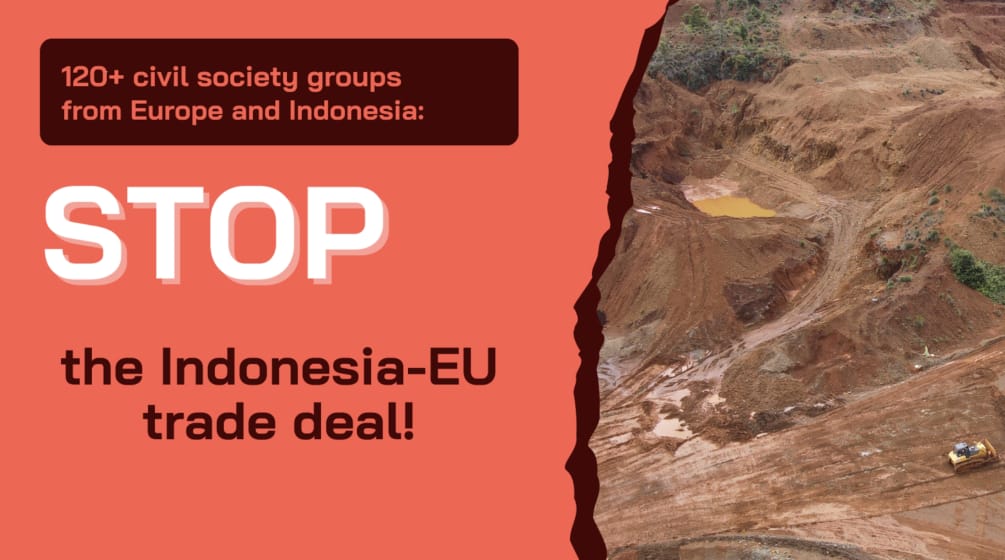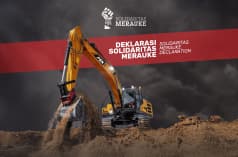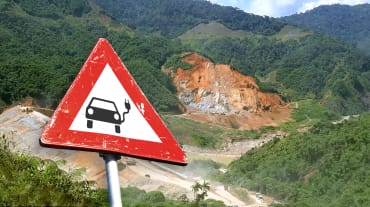Stop the CEPA Indonesia-EU trade deal!
 Poster: STOP the Indonesia-EU trade deal! (© ETJC)
Poster: STOP the Indonesia-EU trade deal! (© ETJC)
Feb 18, 2025
123 civil society groups from Indonesia and Europe, including Rainforest Rescue, are calling for a stop to negotiations for the CEPA free trade agreement. Securing critical raw materials for the EU poses a threat to the environment and human rights in Indonesia.
Energy and raw materials
Since 2016, Indonesia and the European Union have been negotiating a free trade agreement (CEPA). The chapter “Energy and raw materials” regulates market access and investments. Its aim is to ensure there are no barriers for the EU in procuring critical raw materials for the energy transition.
We criticize that this chapter does not effectively address the social and ecological consequences of raw material extraction. It includes no legal consequences or binding enforcement mechanisms to mitigate these impacts.
Without such provisions, we believe that the destruction of rainforests, marine ecosystems, biodiversity and local cultures will be unstoppable.
Social and ecological consequences of raw material exploitation
We urgently warn of negative consequences for nature, communities and the state: erosion of human rights, threats to the environment and weakening of state sovereignty.
Indonesia is estimated to supply over a quarter of the world’s mineral reserves. The country is the world’s largest producer of nickel, along with significant quantities of coal, copper, cobalt, tin, gold and bauxite.
The damage caused by nickel ore mining and nickel production for steel and car batteries on Sulawesi and in the North Moluccas is immense: seas and rivers are polluted, fish stocks are declining, children are suffering from skin conditions, and the livelihoods of local populations and Indigenous communities are under threat.
The rainforest on Sulawesi – with its unique biodiversity – has already been extensively destroyed by the nickel industry. Disasters such as floods and landslides are commonplace. People become impoverished, fall ill, are forcibly displaced or criminalized. Rainforest Rescue has repeatedly highlighted these issues.
Nickel mining in Raja Ampat threatens the planet’s most biodiverse coral reef system and could further exacerbate armed conflict in West Papua.
Economic and political power structure
Our joint statement also criticizes the danger of privatizing public goods and undermining Indonesia’s industrial development. While CEPA would give the EU unhindered access to Indonesia’s market and resources while better protecting international companies, it would prohibit Indonesia from regulating its market.
The agreement could thus lead to more repression within Indonesia. New laws in favor of free trade and investment – such as Indonesia’s “Omnibus Law on Job Creation” – hinder resistance to environmental destruction, displacement and violence.
The statement notes that market liberalization accelerates destruction rather than preventing it. While the EU negotiates trade rules with Indonesia, China has created facts on the ground. Chinese industry has locked in nickel supplies for steel production and electric vehicles. As it stands, 80–82 percent of Indonesia’s battery-grade nickel output is expected to be produced by majority Chinese companies this year. The CEPA agreement would accelerate raw material exploitation with grave social, ecological and political consequences.
We are therefore calling for a stop to CEPA negotiations because the agreement poses a threat to the environment, the climate and human rights.
The joint statement in full:
Joint Statement on Raw Materials in EU-Indonesia CEPA












